必修二Unit 5 Music Period 1 Warming Up & Reading 学案
文档属性
| 名称 | 必修二Unit 5 Music Period 1 Warming Up & Reading 学案 | 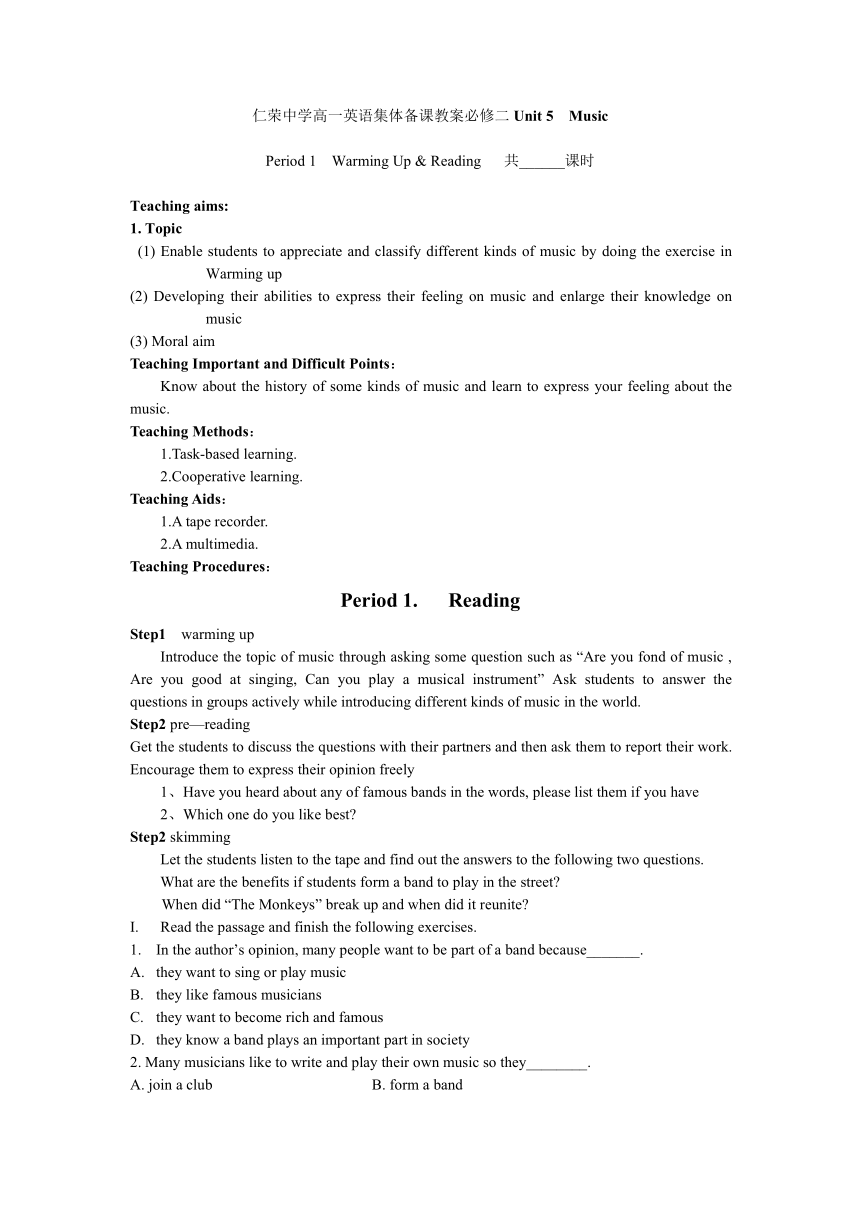 | |
| 格式 | zip | ||
| 文件大小 | 30.4KB | ||
| 资源类型 | 教案 | ||
| 版本资源 | 人教版(新课程标准) | ||
| 科目 | 英语 | ||
| 更新时间 | 2014-02-20 16:15:47 | ||
图片预览

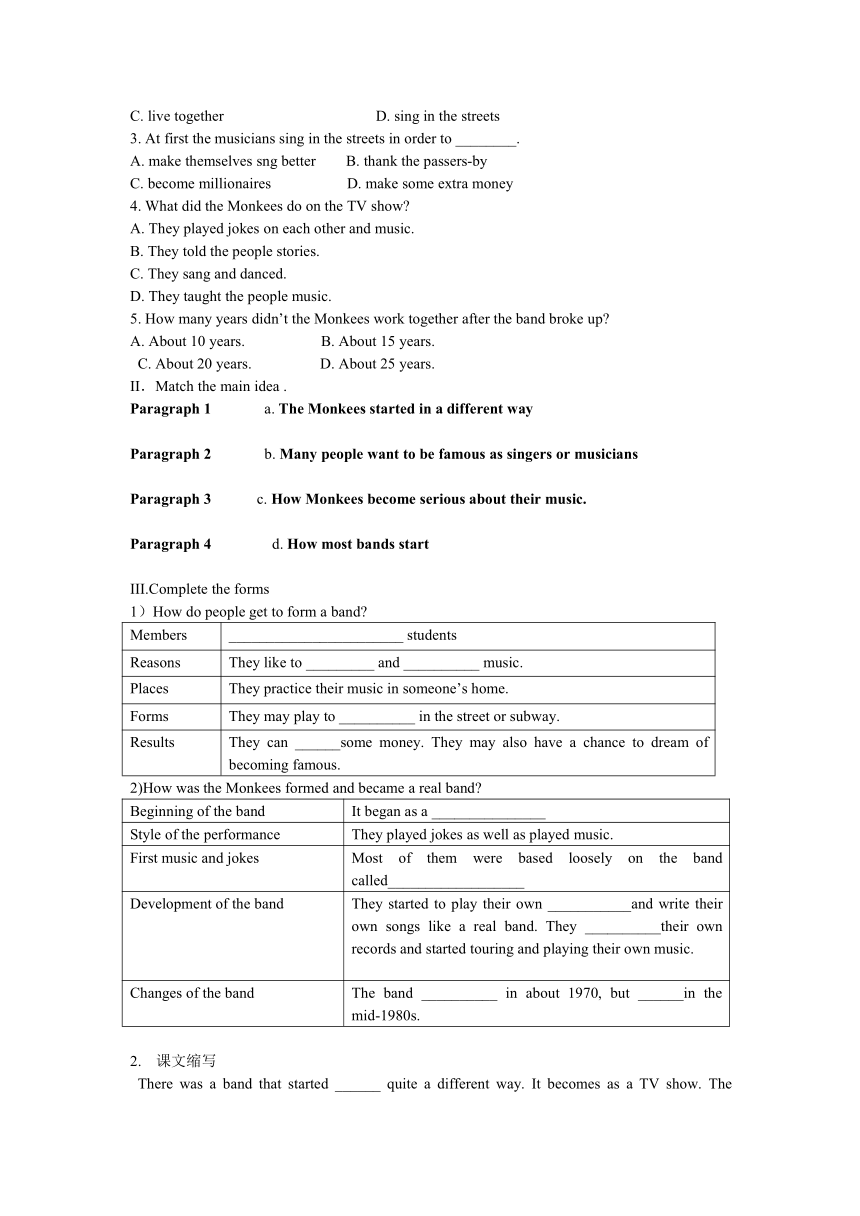
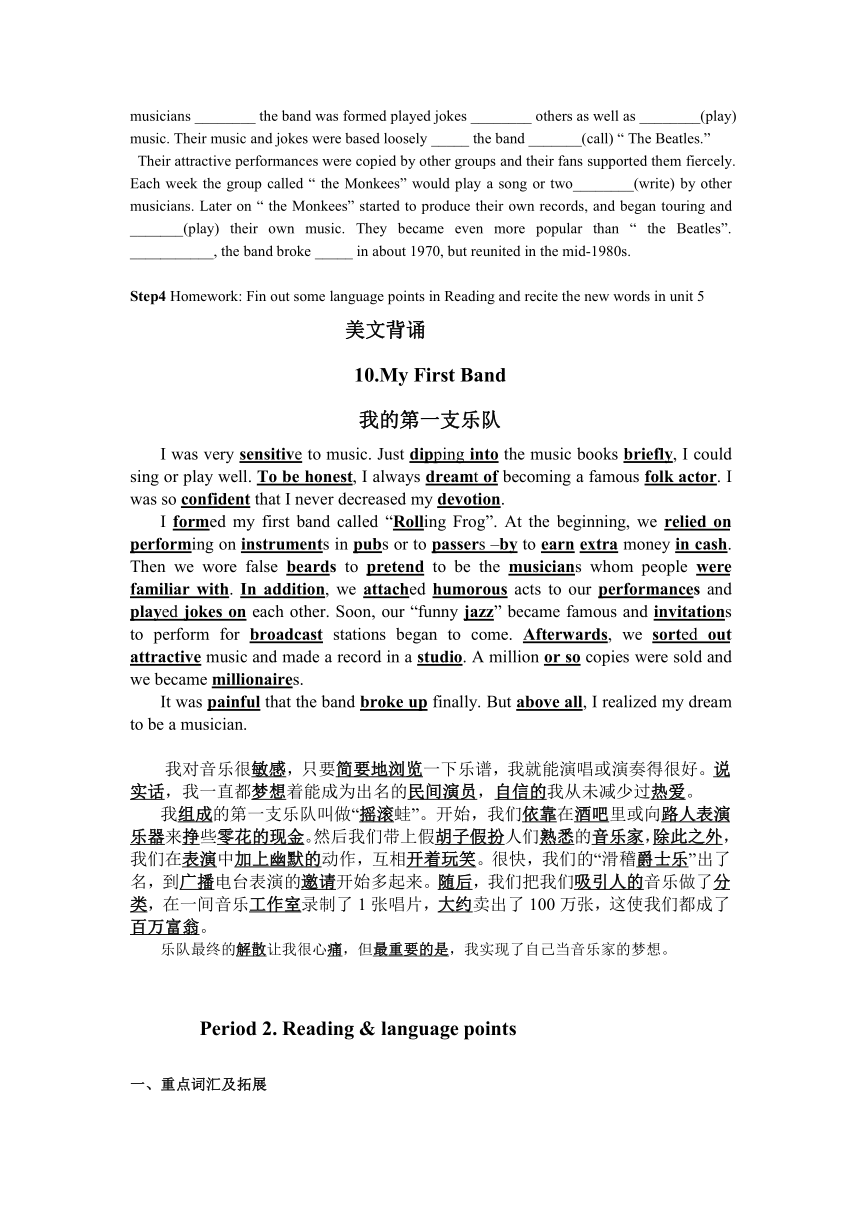
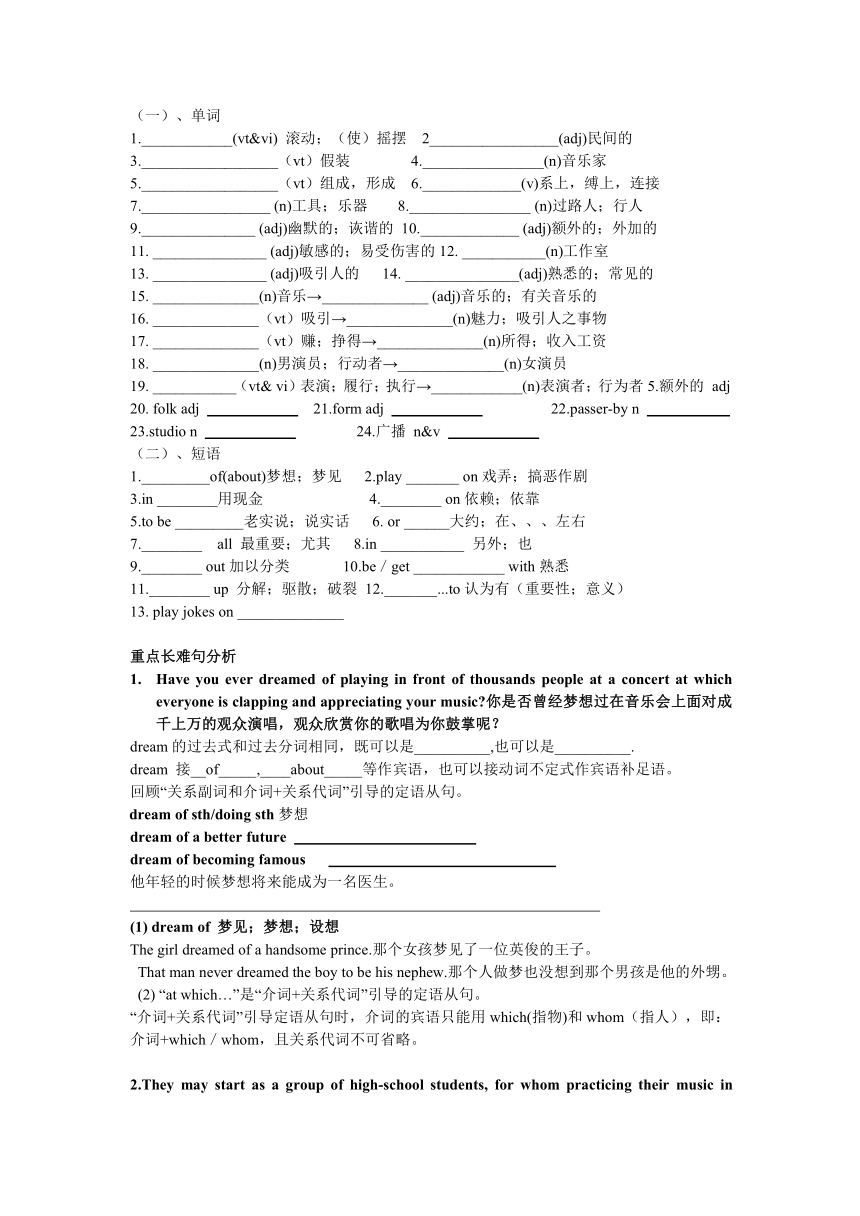
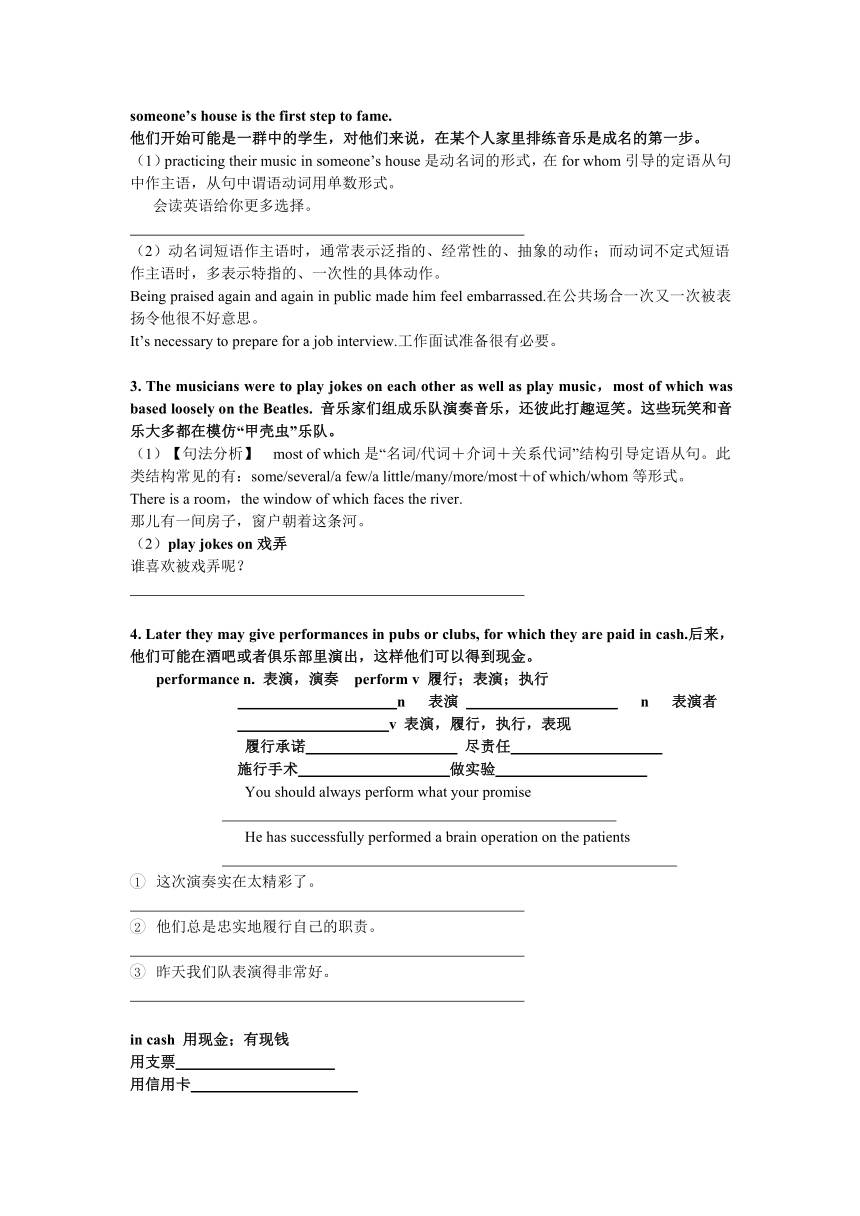
文档简介
仁荣中学高一英语集体备课教案必修二Unit 5 Music
Period 1 Warming Up & Reading 共______课时
Teaching aims:
1. Topic
(1) Enable students to appreciate and classify different kinds of music by doing the exercise in Warming up
(2) Developing their abilities to express their feeling on music and enlarge their knowledge on music
(3) Moral aim
Teaching Important and Difficult Points:
Know about the history of some kinds of music and learn to express your feeling about the music.
Teaching Methods:
1.Task-based learning.
2.Cooperative learning.
Teaching Aids:
1.A tape recorder.
2.A multimedia.
Teaching Procedures:
Period 1. Reading
Step1 warming up
Introduce the topic of music through asking some question such as “Are you fond of music , Are you good at singing, Can you play a musical instrument” Ask students to answer the questions in groups actively while introducing different kinds of music in the world.
Step2 pre—reading
Get the students to discuss the questions with their partners and then ask them to report their work. Encourage them to express their opinion freely
1、Have you heard about any of famous bands in the words, please list them if you have
2、Which one do you like best
Step2 skimming
Let the students listen to the tape and find out the answers to the following two questions.
What are the benefits if students form a band to play in the street
When did “The Monkeys” break up and when did it reunite
Read the passage and finish the following exercises.
In the author’s opinion, many people want to be part of a band because_______.
they want to sing or play music
they like famous musicians
they want to become rich and famous
they know a band plays an important part in society
2. Many musicians like to write and play their own music so they________.
A. join a club B. form a band
C. live together D. sing in the streets
3. At first the musicians sing in the streets in order to ________.
A. make themselves sng better B. thank the passers-by
C. become millionaires D. make some extra money
4. What did the Monkees do on the TV show
A. They played jokes on each other and music.
B. They told the people stories.
C. They sang and danced.
D. They taught the people music.
5. How many years didn’t the Monkees work together after the band broke up
A. About 10 years. B. About 15 years.
C. About 20 years. D. About 25 years.
II.Match the main idea .
Paragraph 1 a. The Monkees started in a different way
Paragraph 2 b. Many people want to be famous as singers or musicians
Paragraph 3 c. How Monkees become serious about their music.
Paragraph 4 d. How most bands start
plete the forms
1)How do people get to form a band
Members _______________________ students
Reasons They like to _________ and __________ music.
Places They practice their music in someone’s home.
Forms They may play to __________ in the street or subway.
Results They can ______some money. They may also have a chance to dream of becoming famous.
2)How was the Monkees formed and became a real band
Beginning of the band It began as a _______________
Style of the performance They played jokes as well as played music.
First music and jokes Most of them were based loosely on the band called__________________
Development of the band They started to play their own ___________and write their own songs like a real band. They __________their own records and started touring and playing their own music.
Changes of the band The band __________ in about 1970, but ______in the mid-1980s.
课文缩写
There was a band that started ______ quite a different way. It becomes as a TV show. The musicians ________ the band was formed played jokes ________ others as well as ________(play) music. Their music and jokes were based loosely _____ the band _______(call) “ The Beatles.”
Their attractive performances were copied by other groups and their fans supported them fiercely. Each week the group called “ the Monkees” would play a song or two________(write) by other musicians. Later on “ the Monkees” started to produce their own records, and began touring and _______(play) their own music. They became even more popular than “ the Beatles”. ___________, the band broke _____ in about 1970, but reunited in the mid-1980s.
Step4 Homework: Fin out some language points in Reading and recite the new words in unit 5
美文背诵
10.My First Band
我的第一支乐队
I was very sensitive to music. Just dipping into the music books briefly, I could sing or play well. To be honest, I always dreamt of becoming a famous folk actor. I was so confident that I never decreased my devotion.
I formed my first band called “Rolling Frog”. At the beginning, we relied on performing on instruments in pubs or to passers –by to earn extra money in cash. Then we wore false beards to pretend to be the musicians whom people were familiar with. In addition, we attached humorous acts to our performances and played jokes on each other. Soon, our “funny jazz” became famous and invitations to perform for broadcast stations began to come. Afterwards, we sorted out attractive music and made a record in a studio. A million or so copies were sold and we became millionaires.
It was painful that the band broke up finally. But above all, I realized my dream to be a musician.
我对音乐很敏感,只要简要地浏览一下乐谱,我就能演唱或演奏得很好。说实话,我一直都梦想着能成为出名的民间演员,自信的我从未减少过热爱。
我组成的第一支乐队叫做“摇滚蛙”。开始,我们依靠在酒吧里或向路人表演乐器来挣些零花的现金。然后我们带上假胡子假扮人们熟悉的音乐家,除此之外,我们在表演中加上幽默的动作,互相开着玩笑。很快,我们的“滑稽爵士乐”出了名,到广播电台表演的邀请开始多起来。随后,我们把我们吸引人的音乐做了分类,在一间音乐工作室录制了1张唱片,大约卖出了100万张,这使我们都成了百万富翁。
乐队最终的解散让我很心痛,但最重要的是,我实现了自己当音乐家的梦想。
Period 2. Reading & language points
一、重点词汇及拓展
(一)、单词
1.____________(vt&vi) 滚动;(使)摇摆 2_________________(adj)民间的
3.__________________(vt)假装 4.________________(n)音乐家
5.__________________(vt)组成,形成 6._____________(v)系上,缚上,连接
7._________________ (n)工具;乐器 8.________________ (n)过路人;行人
9._______________ (adj)幽默的;诙谐的 10._____________ (adj)额外的;外加的
11. _______________ (adj)敏感的;易受伤害的12. ___________(n)工作室
13. _______________ (adj)吸引人的 14. _______________(adj)熟悉的;常见的
15. ______________(n)音乐→______________ (adj)音乐的;有关音乐的
16. ______________(vt)吸引→______________(n)魅力;吸引人之事物
17. ______________(vt)赚;挣得→______________(n)所得;收入工资
18. ______________(n)男演员;行动者→______________(n)女演员
19. ___________(vt& vi)表演;履行;执行→____________(n)表演者;行为者5.额外的 adj 20. folk adj 21.form adj 22.passer-by n
23.studio n 24.广播 n&v
(二)、短语
1._________of(about)梦想;梦见 2.play _______ on戏弄;搞恶作剧
3.in ________用现金 4.________ on依赖;依靠
5.to be _________老实说;说实话 6. or ______大约;在、、、左右
7.________ all 最重要;尤其 8.in ___________ 另外;也
9.________ out加以分类 10.be/get ____________ with熟悉
11.________ up 分解;驱散;破裂 12._______...to认为有(重要性;意义)
13. play jokes on ______________
重点长难句分析
Have you ever dreamed of playing in front of thousands people at a concert at which everyone is clapping and appreciating your music 你是否曾经梦想过在音乐会上面对成千上万的观众演唱,观众欣赏你的歌唱为你鼓掌呢?
dream的过去式和过去分词相同,既可以是__________,也可以是__________.
dream 接__of_____,____about_____等作宾语,也可以接动词不定式作宾语补足语。
回顾“关系副词和介词+关系代词”引导的定语从句。
dream of sth/doing sth梦想
dream of a better future
dream of becoming famous
他年轻的时候梦想将来能成为一名医生。
(1) dream of 梦见;梦想;设想
The girl dreamed of a handsome prince.那个女孩梦见了一位英俊的王子。
That man never dreamed the boy to be his nephew.那个人做梦也没想到那个男孩是他的外甥。
(2) “at which…”是“介词+关系代词”引导的定语从句。
“介词+关系代词”引导定语从句时,介词的宾语只能用which(指物)和whom(指人),即:介词+which/whom,且关系代词不可省略。
2.They may start as a group of high-school students, for whom practicing their music in someone’s house is the first step to fame.
他们开始可能是一群中的学生,对他们来说,在某个人家里排练音乐是成名的第一步。
(1)practicing their music in someone’s house是动名词的形式,在for whom引导的定语从句中作主语,从句中谓语动词用单数形式。
会读英语给你更多选择。
(2)动名词短语作主语时,通常表示泛指的、经常性的、抽象的动作;而动词不定式短语作主语时,多表示特指的、一次性的具体动作。
Being praised again and again in public made him feel embarrassed.在公共场合一次又一次被表扬令他很不好意思。
It’s necessary to prepare for a job interview.工作面试准备很有必要。
3. The musicians were to play jokes on each other as well as play music,most of which was based loosely on the Beatles. 音乐家们组成乐队演奏音乐,还彼此打趣逗笑。这些玩笑和音乐大多都在模仿“甲壳虫”乐队。
(1)【句法分析】 most of which是“名词/代词+介词+关系代词”结构引导定语从句。此类结构常见的有:some/several/a few/a little/many/more/most+of which/whom等形式。
There is a room,the window of which faces the river.
那儿有一间房子,窗户朝着这条河。
(2)play jokes on戏弄
谁喜欢被戏弄呢?
4. Later they may give performances in pubs or clubs, for which they are paid in cash.后来,他们可能在酒吧或者俱乐部里演出,这样他们可以得到现金。
performance n. 表演,演奏 perform v 履行;表演;执行
n 表演 n 表演者
v 表演,履行,执行,表现
履行承诺 尽责任
施行手术 做实验
You should always perform what your promise
He has successfully performed a brain operation on the patients
这次演奏实在太精彩了。
他们总是忠实地履行自己的职责。
昨天我们队表演得非常好。
in cash 用现金;有现钱
用支票
用信用卡
我愿意用现金付账。
5. The band broke up about 1970,but happily they reunited in the mid 1980s.
乐队在1970年左右解散了,但令人高兴的是,他们在80年代中期又重组起来了。
break up 打碎;散开;解体;结束;放假;分裂
break 短语归纳:
break away_______________ break down_________________
break into_______________ break off________________ break out__________________
会议在十一点散会。
②She has just broken up with her boyfriend.
③He broke up under the stress.
6. Above all,just have fun! 最重要的是一定要开心!
all 用法归纳:
after all______________ in all ________________
at all__________________ first of all_______________
all in all______________
孩子们需要很多东西,但最重要的是他们需要关爱。
总的说来,我们玩的很痛快。
我当然钦佩他——毕竟他是一位伟大的作家。
他帮了我很多忙,可我根本不认识他。
Period 3. Language Points
重点词汇
1. pretend vt.假装
pretend that从句 假装、、 pretend+n. 假装、、、
假装去做某事 假装在做
假装做了
她假装知道怎样弹钢琴。
母亲进来时,他假装在做作业。
pretend “假装,假扮”.后面常跟不顶式作定语(翻译下面的句子)
He pretend not to know the faces.
He pretended that he was ill so that he could stay at home.
2.attach vt &vi .附上;系上;贴上;
attach常与介词to连用,构成attach…to…附上;连接上; 认为、、、有重要性
adj. 依恋;附属于 n.附件
be attached to附属于;依恋
辨析attach/ join/connect
attach把小的东西附着于大的东西上
join表示两样东西连接在一起
connect把相对独立的东西连接在一起
把打印机连在电脑上。
__________ the printer to the computer.
我们手牵手跳舞。
We _______ hands and danced.
申请表上请贴一张近照。
他们在协议上附加了一些条件。
Parents attach much importance to education.
3、form n.形状,形态,外形;表格,形式 former (n)
填写表格
无形状的
vt. (使)组成;形成;构成;排列
由…组成 养成好的习惯
form短语归纳:
form the habit of take the form of
in good/great form out of form
一个计划开始在他的脑海中形成。
他已经养成了早起的习惯。
日本是由四个大岛组成的。
To apply for a job,you must fill in/out a form.
earn vt.赚;挣得;获得
earn sb sth 使某人挣得某物,获得某物
_________________=make one’s living谋生
你知道他一个月赚多少钱吗?
(2)His achievement earned him respect and admiration.
5. to be honest (with you) 坦白说;老实告诉你(通常置于句首)
be honest with sb.对某人说老实话;对某人坦诚
It is honest of sb.to do sth.某人做某事是诚实的
说实在的,说真的
I shall be quite honest with you.我会跟你说实话的.
对你说实话,我不同意你的看法。
6. rely on 依靠;信赖;指望
rely用法归纳:
rely on it that...相信……,指望……
指望某人/某事
Now that you are grown up,you should not rely on your parents.
既然你长大了,就不应该依靠你的父母。
The success of this project relies on everyone making an effort.
7. familiar adj.熟悉的;常见的;亲近的
(1)be familiar with 熟悉,通晓。其主语一般是指人的名词,with的宾语是主语通晓的事情。
(2)be familiar to 为、、、所熟悉。其主语一般是人们所通晓的事物,to的宾语通常是指人的名词。
Kate is familiar with the map of China.
The map of China is familiar to Kate.
你对中国古代史熟悉吗?
The voice on the phone sounded familiar to me.
8. famous adj well or widely known
他是一位有名的音乐家。
be famous for
This town is famous for its beautiful buildings
9. clap(clapped, clapping) vt 拍,轻拍,振翼,拍翅膀 vi 拍手
The audience clapped after his speech.
10. extra adj 剩余的,特别的
adv 剩余地,特别地
He is strong enough to carry the cargo , I don’t think he need some extra help.
我以一个特别高的价格买了这幅画。
11.play jokes on sb : speak highly of or amusingly about sb/sth 拿某人开玩笑,与某人开玩笑
他很严肃认真的,别和他开玩笑。
Don’t play jokes on the disables.
12. at first,起初,开头,含有后来不好的意思
At first, she was afraid of water, but she soon later to swim.
13. attractive adj 有吸引力的,有魅力的.
Attract vt 吸引力,引起
Attraction n 吸引力
Like attracts like 物以类聚
那个女孩很有吸引力。
14. sort out: separate from a mass or a large group 分类,拣出
The farmer sorted the best apples for eating
15.be based on: use something as grounds 根据….以….为基础.
这个故事是以真实生活为基础写的。
The news repose is based on entirely on fact.
16. at first,起初,开头,含有后来不好的意思
起初她很怕水,但是很快她就习惯于游泳了。
Period 4. Grammar
语法聚焦
“介词+关系代词”引导定语从句是我们学习定语从句的重点,也是高考的常考点。使用这种结构时,应注意的问题:
关系代词的选用:在介词后作宾语的关系代词一般只用which(指物)和whom(指人)。
The person to _______I spoke just now is the manager that I told you about.
2.介词的位置:介词一般放在关系代词which和whom之前,但也可以放在原来的位置上。
This is the man from whom I learned the news.
=This is the man (_____/_____/_____/) I learned the news from.
3.介词的选择:介词的选择通常由以下几个方面所决定。
(1)动词短语
The man _______ whom our teacher shook hands just now is Mr. Zhang.
该句中shake hands with sb是固定短语,意思是“同、、、握手”。
(2)先行词
This is the way ______ which we worked out the problem.
the way作先行词,意为“方法”,和介词______连用。
(3)句意
The desk ____ which I put my bag is made of wood.我放书包的那张桌子是木制的。
根据句子的意思“放在桌子上”,所以用介词____,如表示“放在桌子里面”,则应用介词____。
自主检测
1. Wind power is an ancient source of energy_____ we may return in the near future.
A. on which B by which C. to which D. from which
2. The house _______ I grew up has been take down and replaced by an office building.
A in it B in C in that D in which
3. We went through a period______ communications were very difficult in the countryside.
A which B in which C whose D with which
4. There are two buildings, _____ stands nearly a hundred feet high.
A the larger B the larger of which C the larger one that D the larger of them
5. We shouldn’t spend our money testing so many people, most of ____are healthy.
A that B which C what D whom
6.The clever boy made a hole in the wall, ____ he could see what was going on inside the house.
A on which B at which C through which D in which
7. There are more than 50 students in each class, ____ are girls.
A half of them B half of which
C half of whom D and half of whom
8.Villagers here depend on the fishing industry, _____ there won’t be much work.
A were B that C by which D without which
9. For many cities in the world, there is no room to spread out further, ______New York is an example.
A for which B in which C of which D from which
10.The journey around the world took the old sailor nine months, _____ the sailing time was 226 days.
A. of which B. during which C. from which D.for which
11. George Orwell, _______ was Eric Arthur, wrote many political novels and essays.
A. the real name B. what his real name
C. his real name D. whose real name
12. ______ is reported in the newspapers, talks between the two countries are making progress.
A. It B. As C. That D. What
13.The schools themselves admit that not all children will be successful in the jobs ______ they are being trained.
A.in that B.for that C.in which D.for which
14.What surprised me was not what he said but he said it.
A.the way B.in the way that
C.in the way D.the way which
15. He was educated at a local grammar school, ______ he went on to Cambridge.
A. from which B. after that C. after which D. from this
Period 1 Warming Up & Reading 共______课时
Teaching aims:
1. Topic
(1) Enable students to appreciate and classify different kinds of music by doing the exercise in Warming up
(2) Developing their abilities to express their feeling on music and enlarge their knowledge on music
(3) Moral aim
Teaching Important and Difficult Points:
Know about the history of some kinds of music and learn to express your feeling about the music.
Teaching Methods:
1.Task-based learning.
2.Cooperative learning.
Teaching Aids:
1.A tape recorder.
2.A multimedia.
Teaching Procedures:
Period 1. Reading
Step1 warming up
Introduce the topic of music through asking some question such as “Are you fond of music , Are you good at singing, Can you play a musical instrument” Ask students to answer the questions in groups actively while introducing different kinds of music in the world.
Step2 pre—reading
Get the students to discuss the questions with their partners and then ask them to report their work. Encourage them to express their opinion freely
1、Have you heard about any of famous bands in the words, please list them if you have
2、Which one do you like best
Step2 skimming
Let the students listen to the tape and find out the answers to the following two questions.
What are the benefits if students form a band to play in the street
When did “The Monkeys” break up and when did it reunite
Read the passage and finish the following exercises.
In the author’s opinion, many people want to be part of a band because_______.
they want to sing or play music
they like famous musicians
they want to become rich and famous
they know a band plays an important part in society
2. Many musicians like to write and play their own music so they________.
A. join a club B. form a band
C. live together D. sing in the streets
3. At first the musicians sing in the streets in order to ________.
A. make themselves sng better B. thank the passers-by
C. become millionaires D. make some extra money
4. What did the Monkees do on the TV show
A. They played jokes on each other and music.
B. They told the people stories.
C. They sang and danced.
D. They taught the people music.
5. How many years didn’t the Monkees work together after the band broke up
A. About 10 years. B. About 15 years.
C. About 20 years. D. About 25 years.
II.Match the main idea .
Paragraph 1 a. The Monkees started in a different way
Paragraph 2 b. Many people want to be famous as singers or musicians
Paragraph 3 c. How Monkees become serious about their music.
Paragraph 4 d. How most bands start
plete the forms
1)How do people get to form a band
Members _______________________ students
Reasons They like to _________ and __________ music.
Places They practice their music in someone’s home.
Forms They may play to __________ in the street or subway.
Results They can ______some money. They may also have a chance to dream of becoming famous.
2)How was the Monkees formed and became a real band
Beginning of the band It began as a _______________
Style of the performance They played jokes as well as played music.
First music and jokes Most of them were based loosely on the band called__________________
Development of the band They started to play their own ___________and write their own songs like a real band. They __________their own records and started touring and playing their own music.
Changes of the band The band __________ in about 1970, but ______in the mid-1980s.
课文缩写
There was a band that started ______ quite a different way. It becomes as a TV show. The musicians ________ the band was formed played jokes ________ others as well as ________(play) music. Their music and jokes were based loosely _____ the band _______(call) “ The Beatles.”
Their attractive performances were copied by other groups and their fans supported them fiercely. Each week the group called “ the Monkees” would play a song or two________(write) by other musicians. Later on “ the Monkees” started to produce their own records, and began touring and _______(play) their own music. They became even more popular than “ the Beatles”. ___________, the band broke _____ in about 1970, but reunited in the mid-1980s.
Step4 Homework: Fin out some language points in Reading and recite the new words in unit 5
美文背诵
10.My First Band
我的第一支乐队
I was very sensitive to music. Just dipping into the music books briefly, I could sing or play well. To be honest, I always dreamt of becoming a famous folk actor. I was so confident that I never decreased my devotion.
I formed my first band called “Rolling Frog”. At the beginning, we relied on performing on instruments in pubs or to passers –by to earn extra money in cash. Then we wore false beards to pretend to be the musicians whom people were familiar with. In addition, we attached humorous acts to our performances and played jokes on each other. Soon, our “funny jazz” became famous and invitations to perform for broadcast stations began to come. Afterwards, we sorted out attractive music and made a record in a studio. A million or so copies were sold and we became millionaires.
It was painful that the band broke up finally. But above all, I realized my dream to be a musician.
我对音乐很敏感,只要简要地浏览一下乐谱,我就能演唱或演奏得很好。说实话,我一直都梦想着能成为出名的民间演员,自信的我从未减少过热爱。
我组成的第一支乐队叫做“摇滚蛙”。开始,我们依靠在酒吧里或向路人表演乐器来挣些零花的现金。然后我们带上假胡子假扮人们熟悉的音乐家,除此之外,我们在表演中加上幽默的动作,互相开着玩笑。很快,我们的“滑稽爵士乐”出了名,到广播电台表演的邀请开始多起来。随后,我们把我们吸引人的音乐做了分类,在一间音乐工作室录制了1张唱片,大约卖出了100万张,这使我们都成了百万富翁。
乐队最终的解散让我很心痛,但最重要的是,我实现了自己当音乐家的梦想。
Period 2. Reading & language points
一、重点词汇及拓展
(一)、单词
1.____________(vt&vi) 滚动;(使)摇摆 2_________________(adj)民间的
3.__________________(vt)假装 4.________________(n)音乐家
5.__________________(vt)组成,形成 6._____________(v)系上,缚上,连接
7._________________ (n)工具;乐器 8.________________ (n)过路人;行人
9._______________ (adj)幽默的;诙谐的 10._____________ (adj)额外的;外加的
11. _______________ (adj)敏感的;易受伤害的12. ___________(n)工作室
13. _______________ (adj)吸引人的 14. _______________(adj)熟悉的;常见的
15. ______________(n)音乐→______________ (adj)音乐的;有关音乐的
16. ______________(vt)吸引→______________(n)魅力;吸引人之事物
17. ______________(vt)赚;挣得→______________(n)所得;收入工资
18. ______________(n)男演员;行动者→______________(n)女演员
19. ___________(vt& vi)表演;履行;执行→____________(n)表演者;行为者5.额外的 adj 20. folk adj 21.form adj 22.passer-by n
23.studio n 24.广播 n&v
(二)、短语
1._________of(about)梦想;梦见 2.play _______ on戏弄;搞恶作剧
3.in ________用现金 4.________ on依赖;依靠
5.to be _________老实说;说实话 6. or ______大约;在、、、左右
7.________ all 最重要;尤其 8.in ___________ 另外;也
9.________ out加以分类 10.be/get ____________ with熟悉
11.________ up 分解;驱散;破裂 12._______...to认为有(重要性;意义)
13. play jokes on ______________
重点长难句分析
Have you ever dreamed of playing in front of thousands people at a concert at which everyone is clapping and appreciating your music 你是否曾经梦想过在音乐会上面对成千上万的观众演唱,观众欣赏你的歌唱为你鼓掌呢?
dream的过去式和过去分词相同,既可以是__________,也可以是__________.
dream 接__of_____,____about_____等作宾语,也可以接动词不定式作宾语补足语。
回顾“关系副词和介词+关系代词”引导的定语从句。
dream of sth/doing sth梦想
dream of a better future
dream of becoming famous
他年轻的时候梦想将来能成为一名医生。
(1) dream of 梦见;梦想;设想
The girl dreamed of a handsome prince.那个女孩梦见了一位英俊的王子。
That man never dreamed the boy to be his nephew.那个人做梦也没想到那个男孩是他的外甥。
(2) “at which…”是“介词+关系代词”引导的定语从句。
“介词+关系代词”引导定语从句时,介词的宾语只能用which(指物)和whom(指人),即:介词+which/whom,且关系代词不可省略。
2.They may start as a group of high-school students, for whom practicing their music in someone’s house is the first step to fame.
他们开始可能是一群中的学生,对他们来说,在某个人家里排练音乐是成名的第一步。
(1)practicing their music in someone’s house是动名词的形式,在for whom引导的定语从句中作主语,从句中谓语动词用单数形式。
会读英语给你更多选择。
(2)动名词短语作主语时,通常表示泛指的、经常性的、抽象的动作;而动词不定式短语作主语时,多表示特指的、一次性的具体动作。
Being praised again and again in public made him feel embarrassed.在公共场合一次又一次被表扬令他很不好意思。
It’s necessary to prepare for a job interview.工作面试准备很有必要。
3. The musicians were to play jokes on each other as well as play music,most of which was based loosely on the Beatles. 音乐家们组成乐队演奏音乐,还彼此打趣逗笑。这些玩笑和音乐大多都在模仿“甲壳虫”乐队。
(1)【句法分析】 most of which是“名词/代词+介词+关系代词”结构引导定语从句。此类结构常见的有:some/several/a few/a little/many/more/most+of which/whom等形式。
There is a room,the window of which faces the river.
那儿有一间房子,窗户朝着这条河。
(2)play jokes on戏弄
谁喜欢被戏弄呢?
4. Later they may give performances in pubs or clubs, for which they are paid in cash.后来,他们可能在酒吧或者俱乐部里演出,这样他们可以得到现金。
performance n. 表演,演奏 perform v 履行;表演;执行
n 表演 n 表演者
v 表演,履行,执行,表现
履行承诺 尽责任
施行手术 做实验
You should always perform what your promise
He has successfully performed a brain operation on the patients
这次演奏实在太精彩了。
他们总是忠实地履行自己的职责。
昨天我们队表演得非常好。
in cash 用现金;有现钱
用支票
用信用卡
我愿意用现金付账。
5. The band broke up about 1970,but happily they reunited in the mid 1980s.
乐队在1970年左右解散了,但令人高兴的是,他们在80年代中期又重组起来了。
break up 打碎;散开;解体;结束;放假;分裂
break 短语归纳:
break away_______________ break down_________________
break into_______________ break off________________ break out__________________
会议在十一点散会。
②She has just broken up with her boyfriend.
③He broke up under the stress.
6. Above all,just have fun! 最重要的是一定要开心!
all 用法归纳:
after all______________ in all ________________
at all__________________ first of all_______________
all in all______________
孩子们需要很多东西,但最重要的是他们需要关爱。
总的说来,我们玩的很痛快。
我当然钦佩他——毕竟他是一位伟大的作家。
他帮了我很多忙,可我根本不认识他。
Period 3. Language Points
重点词汇
1. pretend vt.假装
pretend that从句 假装、、 pretend+n. 假装、、、
假装去做某事 假装在做
假装做了
她假装知道怎样弹钢琴。
母亲进来时,他假装在做作业。
pretend “假装,假扮”.后面常跟不顶式作定语(翻译下面的句子)
He pretend not to know the faces.
He pretended that he was ill so that he could stay at home.
2.attach vt &vi .附上;系上;贴上;
attach常与介词to连用,构成attach…to…附上;连接上; 认为、、、有重要性
adj. 依恋;附属于 n.附件
be attached to附属于;依恋
辨析attach/ join/connect
attach把小的东西附着于大的东西上
join表示两样东西连接在一起
connect把相对独立的东西连接在一起
把打印机连在电脑上。
__________ the printer to the computer.
我们手牵手跳舞。
We _______ hands and danced.
申请表上请贴一张近照。
他们在协议上附加了一些条件。
Parents attach much importance to education.
3、form n.形状,形态,外形;表格,形式 former (n)
填写表格
无形状的
vt. (使)组成;形成;构成;排列
由…组成 养成好的习惯
form短语归纳:
form the habit of take the form of
in good/great form out of form
一个计划开始在他的脑海中形成。
他已经养成了早起的习惯。
日本是由四个大岛组成的。
To apply for a job,you must fill in/out a form.
earn vt.赚;挣得;获得
earn sb sth 使某人挣得某物,获得某物
_________________=make one’s living谋生
你知道他一个月赚多少钱吗?
(2)His achievement earned him respect and admiration.
5. to be honest (with you) 坦白说;老实告诉你(通常置于句首)
be honest with sb.对某人说老实话;对某人坦诚
It is honest of sb.to do sth.某人做某事是诚实的
说实在的,说真的
I shall be quite honest with you.我会跟你说实话的.
对你说实话,我不同意你的看法。
6. rely on 依靠;信赖;指望
rely用法归纳:
rely on it that...相信……,指望……
指望某人/某事
Now that you are grown up,you should not rely on your parents.
既然你长大了,就不应该依靠你的父母。
The success of this project relies on everyone making an effort.
7. familiar adj.熟悉的;常见的;亲近的
(1)be familiar with 熟悉,通晓。其主语一般是指人的名词,with的宾语是主语通晓的事情。
(2)be familiar to 为、、、所熟悉。其主语一般是人们所通晓的事物,to的宾语通常是指人的名词。
Kate is familiar with the map of China.
The map of China is familiar to Kate.
你对中国古代史熟悉吗?
The voice on the phone sounded familiar to me.
8. famous adj well or widely known
他是一位有名的音乐家。
be famous for
This town is famous for its beautiful buildings
9. clap(clapped, clapping) vt 拍,轻拍,振翼,拍翅膀 vi 拍手
The audience clapped after his speech.
10. extra adj 剩余的,特别的
adv 剩余地,特别地
He is strong enough to carry the cargo , I don’t think he need some extra help.
我以一个特别高的价格买了这幅画。
11.play jokes on sb : speak highly of or amusingly about sb/sth 拿某人开玩笑,与某人开玩笑
他很严肃认真的,别和他开玩笑。
Don’t play jokes on the disables.
12. at first,起初,开头,含有后来不好的意思
At first, she was afraid of water, but she soon later to swim.
13. attractive adj 有吸引力的,有魅力的.
Attract vt 吸引力,引起
Attraction n 吸引力
Like attracts like 物以类聚
那个女孩很有吸引力。
14. sort out: separate from a mass or a large group 分类,拣出
The farmer sorted the best apples for eating
15.be based on: use something as grounds 根据….以….为基础.
这个故事是以真实生活为基础写的。
The news repose is based on entirely on fact.
16. at first,起初,开头,含有后来不好的意思
起初她很怕水,但是很快她就习惯于游泳了。
Period 4. Grammar
语法聚焦
“介词+关系代词”引导定语从句是我们学习定语从句的重点,也是高考的常考点。使用这种结构时,应注意的问题:
关系代词的选用:在介词后作宾语的关系代词一般只用which(指物)和whom(指人)。
The person to _______I spoke just now is the manager that I told you about.
2.介词的位置:介词一般放在关系代词which和whom之前,但也可以放在原来的位置上。
This is the man from whom I learned the news.
=This is the man (_____/_____/_____/) I learned the news from.
3.介词的选择:介词的选择通常由以下几个方面所决定。
(1)动词短语
The man _______ whom our teacher shook hands just now is Mr. Zhang.
该句中shake hands with sb是固定短语,意思是“同、、、握手”。
(2)先行词
This is the way ______ which we worked out the problem.
the way作先行词,意为“方法”,和介词______连用。
(3)句意
The desk ____ which I put my bag is made of wood.我放书包的那张桌子是木制的。
根据句子的意思“放在桌子上”,所以用介词____,如表示“放在桌子里面”,则应用介词____。
自主检测
1. Wind power is an ancient source of energy_____ we may return in the near future.
A. on which B by which C. to which D. from which
2. The house _______ I grew up has been take down and replaced by an office building.
A in it B in C in that D in which
3. We went through a period______ communications were very difficult in the countryside.
A which B in which C whose D with which
4. There are two buildings, _____ stands nearly a hundred feet high.
A the larger B the larger of which C the larger one that D the larger of them
5. We shouldn’t spend our money testing so many people, most of ____are healthy.
A that B which C what D whom
6.The clever boy made a hole in the wall, ____ he could see what was going on inside the house.
A on which B at which C through which D in which
7. There are more than 50 students in each class, ____ are girls.
A half of them B half of which
C half of whom D and half of whom
8.Villagers here depend on the fishing industry, _____ there won’t be much work.
A were B that C by which D without which
9. For many cities in the world, there is no room to spread out further, ______New York is an example.
A for which B in which C of which D from which
10.The journey around the world took the old sailor nine months, _____ the sailing time was 226 days.
A. of which B. during which C. from which D.for which
11. George Orwell, _______ was Eric Arthur, wrote many political novels and essays.
A. the real name B. what his real name
C. his real name D. whose real name
12. ______ is reported in the newspapers, talks between the two countries are making progress.
A. It B. As C. That D. What
13.The schools themselves admit that not all children will be successful in the jobs ______ they are being trained.
A.in that B.for that C.in which D.for which
14.What surprised me was not what he said but he said it.
A.the way B.in the way that
C.in the way D.the way which
15. He was educated at a local grammar school, ______ he went on to Cambridge.
A. from which B. after that C. after which D. from this
